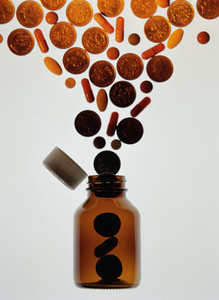The Generic Pharmaceutical Association (GPhA) and its Biosimilars Council have raised concerns that the Centers for Medicare & Medicaid Services (CMS) proposed demonstration to revamp how Part B pays for prescription drugs will ‘erode the economic incentives that drive the US healthcare system to lower-cost therapeutic alternatives’, especially for biosimilars.
GPhA raises concerns over CMS biosimilars reimbursement policy
Home/Policies & Legislation
|
Posted 17/06/2016
 0
Post your comment
0
Post your comment

In July 2015, the Centers for Medicare & Medicaid Services (CMS), which provides health insurance for the elderly and children in the US, released a proposed rule for the reimbursement of biosimilars [1]. However, despite various groups raising concerns about the proposal the policy was finalized in 2015 and took effect on 1 January 2016.
The proposed rule (CMS-1631-P) would assign a single code [Healthcare Common Procedure Coding System (HCPCS)] to all biosimilars of a particular reference product and would reimburse them based on the weighted average of their average sales price under Medicare Part B. However, the GPhA is concerned that ‘the current coding policy and [average sales price] (ASP) calculation methodology for non-interchangeable biosimilars presents a major departure from previous CMS policy and unfairly disadvantages non-interchangeable biosimilars’. The GPhA and its Biosimilars Council continue to oppose the coding and payment policy of the CMS for non-interchangeable biosimilars.
The GPhA also ‘has serious concerns that the demonstration, as proposed, risks limiting the savings created through open market competition, particularly in the nascent biosimilars market’. Therefore they believe ‘that Phase II of the proposal does not create an environment where generic or biosimilar products are compared with anything other than their intended reference product’.
The GPhA is therefore requesting that CMS reflect the following policies in its final rule:
Phase I:
- CMS should alter the proposed payment limit to account for the effects of sequestration
- For any biosimilars included in the model, the biosimilar’s add-on percentage must be based on the ASP of the reference product
- CMS should reverse current coding and payment policy for non-interchangeable biosimilars, and assign non-interchangeable biosimilars unique HCPCS codes and ASP calculations
Phase II:
- Any value-based model must maintain direct, price-based competition between reference products and their lower-cost alternatives
- Any evaluation of value-based purchasing tools must consider the total cost of patient care outside of pharmaceutical costs
- Value-based purchasing tools should only be applied to biosimilars when an applicable reference product is also subject to the tool
Ms Christine Simmon, Senior Vice President, Policy and Strategic Alliances, GPhA, concludes by saying that ‘generic drugs and biosimilars can play a significant role in CMS efforts to lower health costs’ and that the GPhA is looking forward ‘to working with CMS to expand beneficiary access to more affordable alternatives to high-cost products’.
Related articles
Payers in US getting ready for biosimilars
US health insurance CMS outlines biosimilar policy
Reference
1. GaBI Online - Generics and Biosimilars Initiative. Concerns raised over CMS biosimilars reimbursement policy [www.gabionline.net]. Mol, Belgium: Pro Pharma Communications International; [cited 2016 Jun 17]. Available from: www.gabionline.net/Policies-Legislation/Concerns-raised-over-CMS-biosimilars-reimbursement-policy
Permission granted to reproduce for personal and non-commercial use only. All other reproduction, copy or reprinting of all or part of any ‘Content’ found on this website is strictly prohibited without the prior consent of the publisher. Contact the publisher to obtain permission before redistributing.
Copyright – Unless otherwise stated all contents of this website are © 2016 Pro Pharma Communications International. All Rights Reserved.
Source: GPhA
Guidelines
US guidance to remove biosimilar comparative efficacy studies
New guidance for biologicals in Pakistan and Hong Kong’s independent drug regulatory authority
WHO to remove animal tests and establish 17 reference standards for biologicals

Home/Policies & Legislation Posted 07/01/2026
ANVISA tackles 24-month backlog in biologicals post-registration petitions

Home/Policies & Legislation Posted 10/10/2025
The best selling biotechnology drugs of 2008: the next biosimilars targets








Post your comment